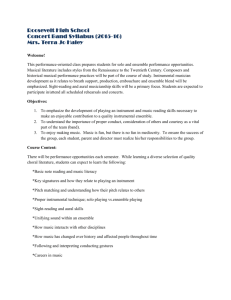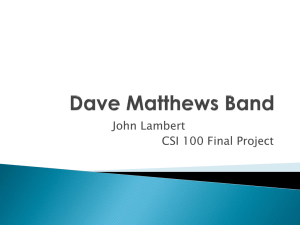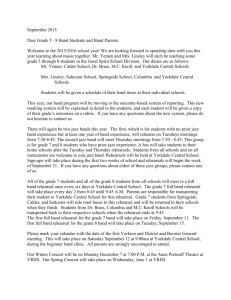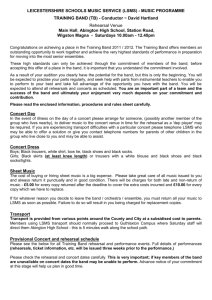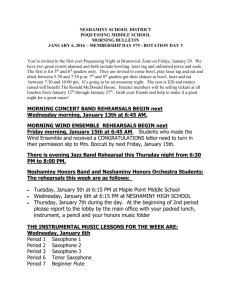File
advertisement
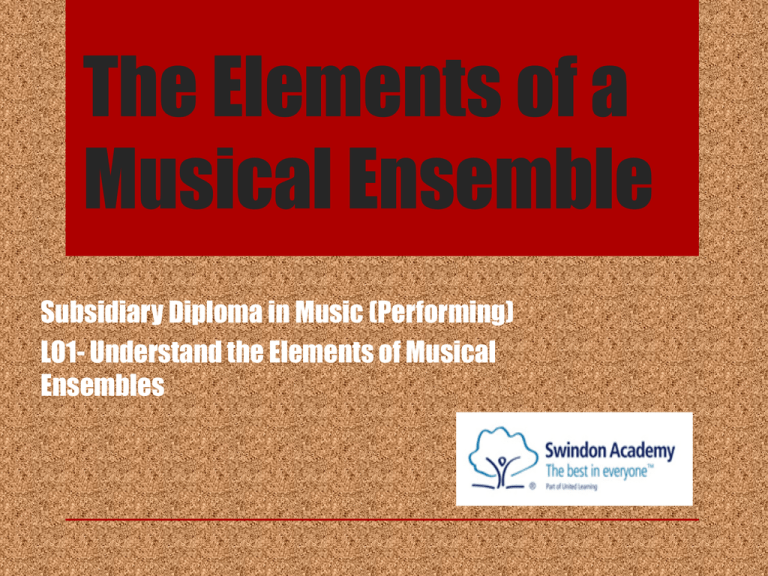
The Elements of a Musical Ensemble Subsidiary Diploma in Music (Performing) LO1- Understand the Elements of Musical Ensembles Anyone can form a band… but how good it is depends on organisation and communication skills, along with a will to want to play together. Band members should be suited to one another in order to achieve the best results. Ideally the band should equally contribute to the bandhowever, there are numerous bands who were not equal but achieved major success. Band Members Bands who were NOT equal: The Beatles Pink Floyd Bands who were equal: Abba Fleetwood Mac Bands: does equality matter? There are numerous ways in which to do this: Form one with friends who share similar musical interests and capabilities Join a musical club- there’s bound to be people in there who have a similar ambition to you! Check your local music shop, there are usually loads of adverts on the door Search the internet!- its surprising how many sites that are dedicated to finding you other local musicians to play with. . . . Or make one How to join a band? Without organisation, a band cannot survive. Band members should come to an agreement agree among one another when organising issues- e.g. dates for rehearsal, repertoire and solos. Band members need to be aware of the decisions made by other members so that they can organise themselves . . . this all depends on good band communication! Organisation Communication is key: -band discussions (listening skills + cooperation) -musical interaction -audience interaction You need to be able to listen carefully to what you and others are communicating and then adjust to that!- may result in re-scheduling, playing at a different dynamic level etc. Communication You need to get out and play to the public in as many venues as possible- make a target for yourself like “I will play in at least 5 venues this year” and stick to it! Many famous bands and artists promote their music on sites such as MySpace and Facebook- Lilly Allen and Arctic Monkeys became famous to an extent because of this! How do you communicate your music to as many as possible? Without rehearsal, a band cannot improve. Rehearsal is just like our solo practice, yet if you’re in a band, you need to do BOTH! Issues arise that don’t normally occur in solo practice- you need to make sure that the sound you produce is consistently together. Rehearsal… is REALLY vital A weekly rehearsal = ESSENTIAL Longer rehearsals may be necessary to polish the band in time for a performance My local choir always holds weekly rehearsals and when the performance time draws nearer we are expected to attend longer rehearsals (sometimes more than once in a week)similar to the ‘Joseph’ production! Rehearsals are usually 2 hours in length- but it depends on who you are catering for. Examples • Repertoire will depend on what music your band plays and which areas you specialise in. • Repertoire should be chosen together- you must consider everyone’s suggestions (communication and listening skills) • Its important that all the members of your band like the repertoire that you have chosen, otherwise they may not put in much effort. Repertoire If you sign up to a school band, for instance for a production, then you should have a knowledge of that production to judge whether the music would engage you. At my local choir, every year we are allowed to vote what repertoire we wish to sing over the upcoming year, every member of the choir is given a vote and we can either agree with someone else’s findings or find other repertoire to suggest- this will all be considered. Examples Of the band: Strengths: organised, cooperative, imaginative + inventive, equality, a strong will, best intentions for the band, friendship, aims + ambitions, determination. Weaknesses: unorganised, uninterested, very mainstream, biased status of members, uninspired, factions + alliances, dis- functional. Strengths & Weaknesses Of the rehearsals: Strengths: set targets for the rehearsal are achieved, each band member knows the music, focussed session, members on time= Great music Weaknesses: targets are not set previous to a rehearsal and therefore nothing is achieved, band members have not worked separately on the music, discordant atmosphere, laid- back approach to the rehearsal (lateness, distractions etc.)= Random sound Strengths & Weaknesses

